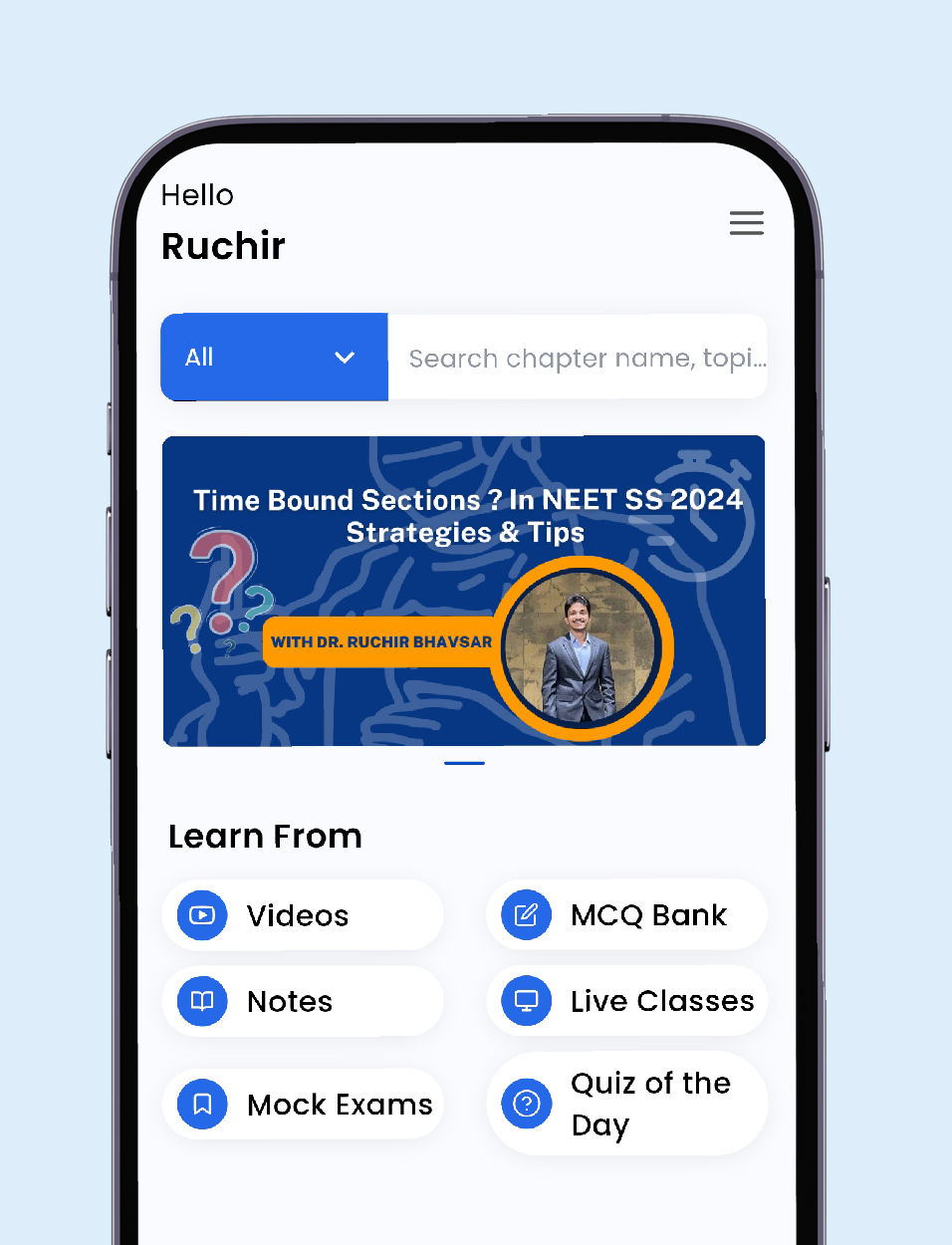By: Dr. Ruchir Bhavsar
Introduction
Preparing for the NEET-SS Surgical Group can be a daunting task, especially with the evolving exam patterns and the pressure of competing for top ranks. In this blog post, Dr. Ruchir Bhavsar, a Chief Faculty in Surgical Gastroenterology, provides a comprehensive guide on how to prepare effectively for NEET-SS 2025. The advice provided is aimed at students who will be appearing for the exam, including those who are awaiting results from NEET-SS 2024 or those already preparing for the upcoming exams.
Key Points to Keep in Mind
1. Exam Timeline
As the NEET-SS 2024 exam was delayed, it is expected that NEET-SS 2025 will be held towards the end of this year, between September and November. This gives students ample time to focus on their preparation, even before the results of NEET-SS 2024 are out. By starting early, candidates can have a strategic edge in preparing for the exam.
2. Importance of Covering All Three Books
One of the most important aspects of preparing for NEET-SS 2025 is the extensive use of the textbooks Bailey, Sabiston, and Schwartz. These three books are essential, as NEET-SS 2024 saw equal coverage from all three. It is important to cover them in detail, not just focusing on important topics but ensuring a comprehensive understanding of all the material.
- Bailey 28th edition
- Sabiston 21st edition
- Schwartz 11th edition
Dr. Bhavsar stresses that you should aim to cover all these books thoroughly, as they form the core content for the exam. This is crucial for achieving a high rank in NEET-SS, especially considering the changes in the exam pattern in the last few years.
3. Shifting Exam Patterns
From Dr. Bhavsar’s experience, the exam pattern for NEET-SS has evolved over the years. The distribution of questions has become more balanced between the three books, with about 120 questions being sourced from these textbooks. Additionally, 30 questions may come from outside the books, testing deeper concepts and advanced knowledge. Therefore, students must be thorough with all three books to stand a chance at scoring high.
4. How to Approach Each Book
- Read with Purpose: It is important to read all three books with a clear purpose of completing them. Start by covering general topics like the basic surgical principles and work through each book systematically.
- Conceptual Clarity: Rather than reading to memorize facts, ensure that you are grasping the concepts clearly. Dr. Bhavsar suggests combining reading from all three textbooks to get a holistic understanding of the subject matter.
5. The Importance of Active Note-Taking
Active note-taking and regular revisions are critical. Dr. Bhavsar recommends marking key concepts while reading and revisiting them during subsequent readings. This strategy ensures that you can easily access important information when needed.
- First Reading: This should be a cursory reading where you highlight important points.
- Second and Third Readings: Focus only on the highlighted points and refer to your notes for reinforcement. You can either use your own notes or use resources provided by the LGS platform.
6. Spaced Revision
Spaced revision is an essential strategy for long-term retention. Dr. Bhavsar advises revisiting the topics after specific intervals: 5 days, 15 days, and 1 month. This practice will help you retain concepts and avoid confusion when it comes time for the exam.
7. Linking Theory with MCQ Practice
While understanding theory is essential, linking that knowledge with MCQ practice is equally important. MCQs help you fine-tune your recall ability and prepare for the exam’s format. Dr. Bhavsar emphasizes the need for regular MCQ practice, starting now and continuing throughout your preparation.
8. Smart MCQ Practice
Quality MCQ practice is crucial for success. Rather than solving MCQs right after reading the topic, it’s advisable to solve them after a delay of about one week. This will test your ability to recall the concepts from memory, which is more beneficial for exam preparation.
- Target: Aim for 100 to 150 MCQs per day, keeping in mind the quality over quantity.
- Test Mode: Always solve MCQs in “Test Mode” to simulate the actual exam experience. This helps with time management and prepares you mentally for the time-bound nature of the exam.
- Time Management: Effective time management is crucial, as many students struggle with managing their time during the exam. Practice answering questions within the set time limit and aim to complete each question in about 1 minute.
9. Importance of Mock Exams
Mock exams are vital for assessing your preparation. Regularly taking mock exams helps you get used to the exam format, time constraints, and types of questions that may appear. Dr. Bhavsar recommends incorporating mock exams into your study plan regularly.
Reading and Revision Strategies for NEET-SS 2025 Preparation
1. Smart Reading Approach
It is crucial not to read blindly when preparing for NEET-SS 2025. As Dr. Ruchir Bhavsar suggests, during your second and third readings, focus on active revision rather than just reading through the material. This means identifying key points, marking important sections, and focusing on those during revision. Using trusted sources for notes is essential, as it ensures you’re revising the correct content. Dr. Bhavsar emphasizes that the Bailey, Sabiston, and Schwartz books are all equally important for thorough preparation.
2. How to Tackle Each Book
- Bailey: Start with Bailey as your first book for a simple and structured understanding of the topics. Dr. Bhavsar suggests reading it in detail because Bailey forms the backbone of the NEET-SS exam, and about 30-40 questions are directly based on it. Use Bailey as your foundation, ensuring that you have a strong grasp of its content.
- Sabiston: After completing Bailey, move on to Sabiston. This book is comprehensive and often includes detailed explanations about surgical concepts, clinical trials, and old practices. While it might seem overwhelming, you can filter out redundant information using the notes provided or by marking important sections during your first reading. The focus should be on conceptual clarity rather than memorizing every detail.
- Schwartz: Finally, tackle Schwartz. Many concepts from Bailey and Sabiston are revisited here, so by the time you reach Schwartz, much of the content will feel like a revision. However, Schwartz also includes new topics, which will add to your knowledge base. Consider Schwartz as an extension or revision tool after completing the first two books.
For those unable to read the textbooks in full, Dr. Bhavsar highlights that the detailed notes available from trusted sources can also provide a comprehensive understanding of the material without the need for reading the entire book.
3. The Importance of Notes
Notes play a pivotal role in NEET-SS preparation, particularly for rapid revision. Dr. Bhavsar encourages students to either create their own notes or use high-quality pre-prepared notes. The benefit of notes lies in their concise presentation of the material, which allows for quick revision. Dr. Bhavsar’s platform offers e-notes and hard copy options for this purpose, making it easier for students to review content at their convenience, whether on mobile devices, tablets, or computers.
4. Leveraging Video Lectures
Beyond textbooks and notes, video lectures are an invaluable resource for conceptual clarity. If a topic feels difficult to understand while reading, watching a video explanation can provide visual cues and a deeper understanding. Dr. Bhavsar explains that the LGS platform will soon offer combined video content from all three books—Bailey, Sabiston, and Schwartz. These videos will cover each book in depth, allowing students to reinforce their learning through multimedia.
5. MCQ Practice: Key to Success
Solving MCQs regularly is one of the most effective ways to solidify knowledge. Dr. Bhavsar stresses that quality is more important than quantity when it comes to MCQ practice. It is crucial to approach MCQs methodically, taking time to analyze each question and its options. The Sushruta LGS platform provides over 8,400 MCQs, covering a wide array of topics, including biostatistics, clinical scenarios, and image-based questions.
The key to MCQ success lies in smart practice. Dr. Bhavsar advises students to solve MCQs related to the topics they have studied after a delay (such as one week). This will help with retention and ensure that the student can recall the information during the exam. Additionally, practicing MCQs under time constraints (in test mode) will simulate the pressure of the actual exam and improve time management skills.
6. The Role of Mock Exams
Mock exams are another crucial component of preparation. These exams provide students with a simulation of the real test environment, helping them get accustomed to the time-bound nature of the exam. Dr. Bhavsar’s platform offers mock exams designed to mirror the NEET-SS exam structure, complete with time-bound sections. Regularly taking mock exams will give you the confidence and readiness to tackle the real exam.
Mentorship and Support
Dr. Bhavsar also emphasizes the importance of mentorship during the preparation process. Students can avail themselves of guidance from experts and mentors who have successfully navigated the NEET-SS journey. The LGS platform provides access to faculty members and mentors who can offer feedback, address queries, and help students stay on track with their preparation.
In addition, past students’ feedback can provide valuable insights into the preparation process and how to optimize study strategies.
Time Management and Dedication
Dr. Bhavsar stresses that dedication is the most important factor for NEET-SS success. Whether you’re working or preparing full-time, the key to cracking NEET-SS lies in consistent effort and a solid study plan. While some may need to take time off work to focus solely on preparation, it is possible to manage both work and study simultaneously. However, Dr. Bhavsar’s personal experience proves that full dedication, even for a few months, can lead to success.
Personalized Study Timelines
For those seeking a structured study plan, Dr. Bhavsar recommends using the study planner available on the platform. This tool helps create personalized schedules based on individual reading speeds and study preferences. The study planner generates a timeline that includes reading Bailey, Sabiston, and Schwartz, along with regular practice and revision cycles.
It’s important to understand that timelines for completing the course can vary greatly between individuals, so Dr. Bhavsar advises against feeling pressured to adhere to a set schedule. Instead, focus on maintaining consistency and progress at your own pace.
Final Tips for NEET-SS 2025 Preparation
1. Focus on Core Books: Bailey, Sabiston, and Schwartz
As Dr. Ruchir Bhavsar emphasizes, your primary goal should be to master the content from all three core textbooks—Bailey, Sabiston, and Schwartz. Despite some external distractions or suggestions to focus on only one book or a few topics, Dr. Bhavsar firmly believes that aiming for the highest rank in NEET-SS means being thorough with all three books. These books collectively cover the vast majority of questions in the NEET-SS exam, with about 120 to 130 questions directly based on their content.
While there will always be a few questions outside these books, they make up a small percentage (15-20%) of the exam. Therefore, students should not get bogged down by this small percentage but rather concentrate on mastering the core content. Dr. Bhavsar insists that thorough preparation in these textbooks will significantly increase your chances of securing the highest ranks.
2. Time Allocation and Prioritization
Dr. Bhavsar advises focusing on the following sequence: Bailey first, followed by Sabiston, and finally Schwartz. He suggests starting with Bailey because it provides a solid foundation with clear and easy-to-understand explanations. Once you finish Bailey, move on to Sabiston, which is more detailed and may require more focused attention on important concepts. Finally, Schwartz will act as a revision tool, reinforcing concepts already covered in Bailey and Sabiston, while also introducing new material.
For those feeling that six months isn’t enough time, Dr. Bhavsar reassures that this time frame is sufficient for thorough preparation. Whether you are a working professional or a student preparing full-time, you can complete the course if you dedicate 200% effort. Even with limited time, preparation can be effective, as long as you follow a structured plan and remain consistent.
3. Don’t Focus on External Books
While some topics might be covered in other specialized books like Campbell, Greens, and Youmann, Dr. Bhavsar strongly advises against spending too much time on these. In his experience, only about 15-20% of the questions come from outside the core books. Therefore, spending disproportionate time on niche books is not an efficient strategy. Instead, dedicate your time to the core books and concentrate on the 120 to 130 questions that are highly likely to appear.
4. Stay Consistent and Don’t Switch Resources
Dr. Bhavsar also highlights the importance of consistency in your preparation. Many students tend to switch resources or notes mid-way through their studies, but this can lead to confusion and wasted time. He advises that you stick to one resource throughout your preparation—whether it’s your own notes, the provided notes, or textbooks—so you can build long-term retention. Switching frequently can disrupt your study rhythm, and sticking to one set of resources will allow you to refine your understanding and make the most of your revision.
5. Prepare for a Tough Exam
Finally, Dr. Bhavsar stresses the importance of preparing for a tough exam. Even if the exam turns out to be easier, you’ll be well-prepared to handle it with ease. Over the past years, NEET-SS has consistently asked tough questions, with the majority stemming directly from the three core textbooks. He encourages students to prepare for the most challenging scenarios so that, should the exam be on the harder side, they will be ready to tackle it without stress.
Additional Support: Mock Exams and Mentorship
Dr. Bhavsar’s platform offers more than just content. It includes mock exams, which simulate the real exam environment, helping students hone their time management skills. These mock exams will prepare you for the real test by keeping track of the time, making sure you are ready to perform under pressure. Additionally, detailed analytics of your mock exam performance will help you pinpoint weak areas, so you can improve them over time.
Moreover, Dr. Bhavsar and his team are available for mentorship. You can reach out for help, ask questions, and get personalized advice as you move through your preparation journey. Having access to mentors can be a game-changer, especially when you feel stuck or need guidance on how to tackle difficult concepts.
Use of Technology for Efficient Preparation
The Sushruta LGS platform also incorporates useful features like highlighting and freehand annotations in e-notes, making it easier for students to mark important sections and keep track of critical areas for revision. The ability to switch across devices (mobile, tablet, and desktop) ensures that you can study efficiently, no matter where you are.
6. Conclusion: Aim for the Highest Rank
Dr. Bhavsar’s ultimate message is clear: aim for rank one, and settle for nothing less than your best performance. His preparation strategy revolves around thorough reading, active note-taking, regular MCQ practice, and using mock exams to simulate real test conditions. By following this systematic approach, staying consistent with your preparation, and focusing on the three core textbooks, you will be well on your way to succeeding in NEET-SS 2025.
Remember, it’s not just about studying harder but studying smarter. With the right mindset, dedication, and strategy, achieving top ranks in NEET-SS is not only possible, but highly achievable.






